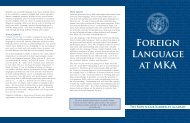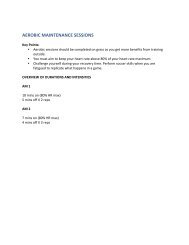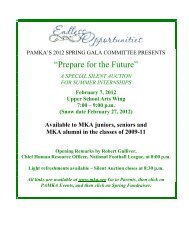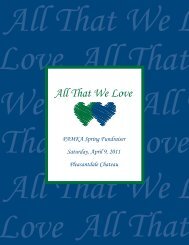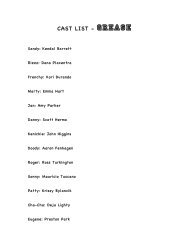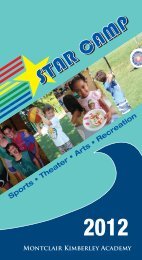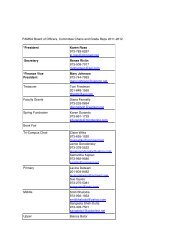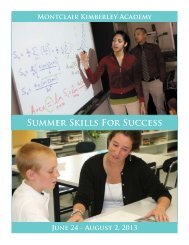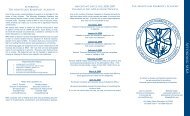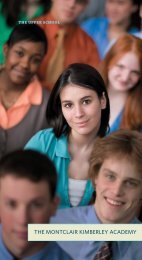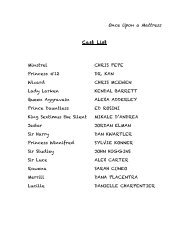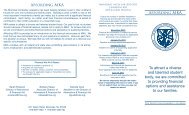Honor Code copy.indd - Montclair Kimberley Academy
Honor Code copy.indd - Montclair Kimberley Academy
Honor Code copy.indd - Montclair Kimberley Academy
You also want an ePaper? Increase the reach of your titles
YUMPU automatically turns print PDFs into web optimized ePapers that Google loves.
ARTICLEVI PROCESSING HONOR VIOLATIONSWhether or not an allegation of an <strong>Honor</strong> <strong>Code</strong> violation comes tothe full <strong>Honor</strong> Council for consideration depends upon the severity of theallegation and/or whether or not the student admits to the violation. TheAcademic Dean, Dean of Students, and Senior Chair will decide whetherthe case will come in front of the full Board. The Head of the Upper Schoolshould be kept involved and informed in the process. In the event that an<strong>Honor</strong> <strong>Code</strong> violation goes to trial, one of the two faculty members willact as secretary. In order for a trial to occur, at least nine members of the<strong>Honor</strong> Council (including Senior Chair) must be present to hear the case.A meeting between the Dean of Students, the Academic Dean, andthe Senior Chair, will determine whether a case goes before the ExecutiveCommittee or the <strong>Honor</strong> Council when a student violates both the <strong>Honor</strong>Pledge and another major code of conduct offense. Generally, the offensedeemed more egregious will determine where the case is heard.Section A – Violations of the <strong>Honor</strong> <strong>Code</strong>If the case does not warrant the meeting of the full <strong>Honor</strong> Council, thenthese procedures will be followed if the student admits to the allegation:1. Academic and Non-Academic Violation: A meeting will be heldwith the person accused of the violation, the person makingthe accusation, the Dean of Students, the Senior Chair, and anadditional <strong>Honor</strong> Council member. The accused and the accuserwill meet with these people separately.2. The full <strong>Honor</strong> Council will be notified of the cases.3. The Head of the Upper School should be involved in each case ina manner that he or she sees as appropriate.When an allegation has been made and the student denies the allegation,or the allegation is deemed to be serious, the student will go before the full<strong>Honor</strong> Council. The <strong>Honor</strong> Council will handle a second violation of the<strong>Honor</strong> <strong>Code</strong> while a student is on <strong>Honor</strong> Probation. Violations of the <strong>Honor</strong><strong>Code</strong> include but are not limited to:PERSONAL DISHONESTY: Personal dishonesty is a <strong>Code</strong> of <strong>Honor</strong> violationand is essential to the preservation of trust in a community. It is considereddishonest for a student to mislead by not telling the whole truth, not statingimportant, relevant information, and not making all reasonable efforts toclear up misunderstandings or unclear areas.ACADEMIC DISHONESTY: Cheating and plagiarism are violations ofthe <strong>Code</strong> of <strong>Honor</strong>. In addition to disciplinary action, students who arefound guilty of cheating or plagiarism may receive a grade of zero for6



